Entrepreneurship & Small Business Management: Venture Types
VerifiedAdded on 2024/06/11
|19
|5195
|141
Report
AI Summary
This report provides a comprehensive analysis of entrepreneurship and small business management, examining various venture types such as private, public, social, lifestyle, intrapreneurial, and corporate ventures. It explores the similarities and differences between these ventures, focusing on corporate vs. public and private vs. social enterprises. Furthermore, the report assesses the impact of small businesses on the economy at local, regional, national, and international levels, using relevant data and statistics to illustrate their significance. It also explains the importance of small businesses and startups in the growth of the social economy, highlighting their roles in employment generation, assisting underprivileged classes, improving sustainability, and ensuring legal business activities. The document is available on Desklib, a platform offering a wealth of study resources for students.

Entrepreneurship and Small Business Management
Paraphrase This Document
Need a fresh take? Get an instant paraphrase of this document with our AI Paraphraser

Table of Contents
Assignment 1...................................................................................................................................3
Introduction..................................................................................................................................3
LO1 Explore and illustrate the range of venture types that might be considered entrepreneurial
.....................................................................................................................................................3
LO2 Assess the impact of small businesses on the economy......................................................6
Conclusion.................................................................................................................................10
Assignment 2.................................................................................................................................11
Introduction................................................................................................................................11
LO3 Determine and assess the key aspects of an entrepreneurial mind-set..............................11
LO4 Examine the different environments that foster or hinder entrepreneurship.....................14
Conclusion.................................................................................................................................15
Reference List................................................................................................................................17
Assignment 1...................................................................................................................................3
Introduction..................................................................................................................................3
LO1 Explore and illustrate the range of venture types that might be considered entrepreneurial
.....................................................................................................................................................3
LO2 Assess the impact of small businesses on the economy......................................................6
Conclusion.................................................................................................................................10
Assignment 2.................................................................................................................................11
Introduction................................................................................................................................11
LO3 Determine and assess the key aspects of an entrepreneurial mind-set..............................11
LO4 Examine the different environments that foster or hinder entrepreneurship.....................14
Conclusion.................................................................................................................................15
Reference List................................................................................................................................17
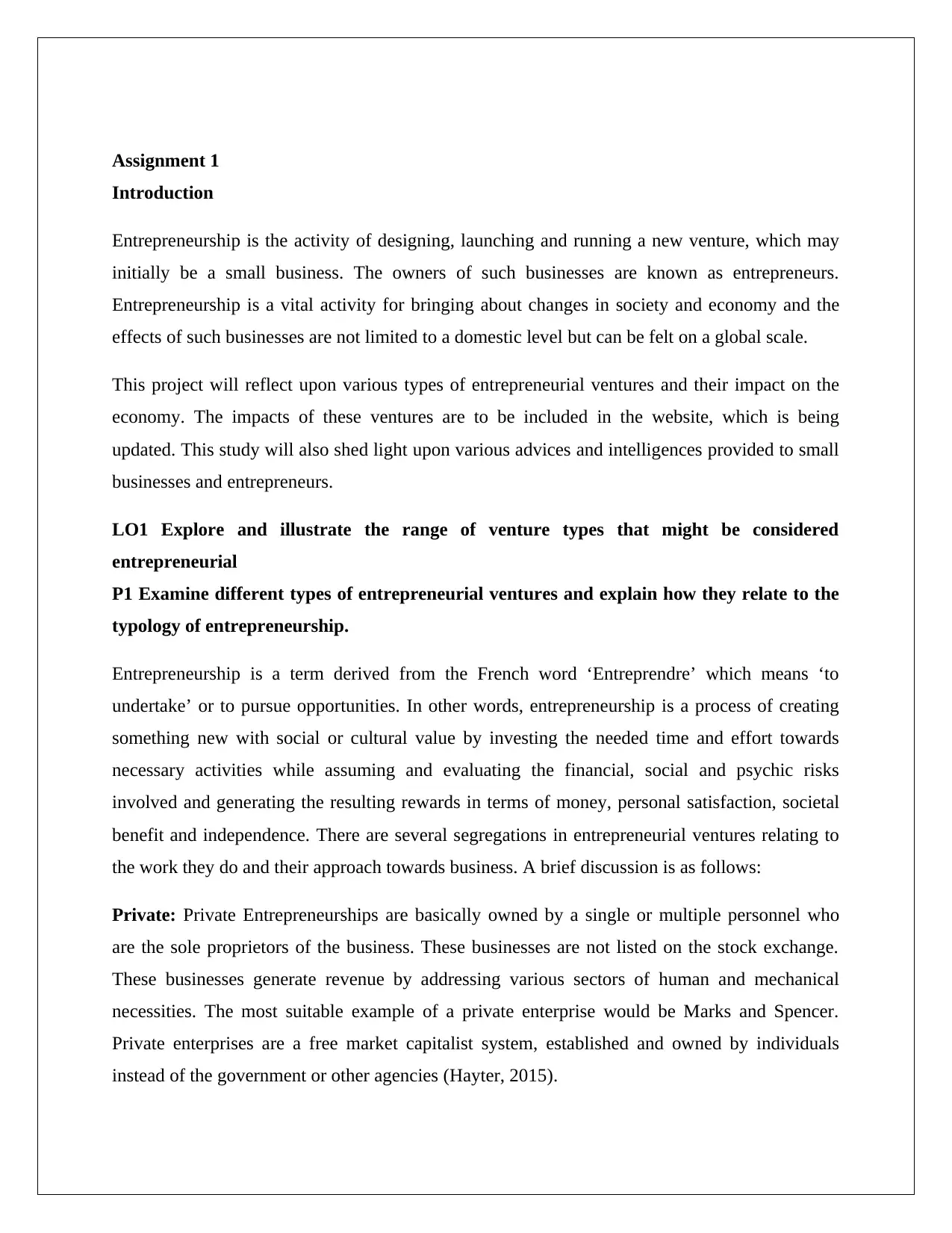
Assignment 1
Introduction
Entrepreneurship is the activity of designing, launching and running a new venture, which may
initially be a small business. The owners of such businesses are known as entrepreneurs.
Entrepreneurship is a vital activity for bringing about changes in society and economy and the
effects of such businesses are not limited to a domestic level but can be felt on a global scale.
This project will reflect upon various types of entrepreneurial ventures and their impact on the
economy. The impacts of these ventures are to be included in the website, which is being
updated. This study will also shed light upon various advices and intelligences provided to small
businesses and entrepreneurs.
LO1 Explore and illustrate the range of venture types that might be considered
entrepreneurial
P1 Examine different types of entrepreneurial ventures and explain how they relate to the
typology of entrepreneurship.
Entrepreneurship is a term derived from the French word ‘Entreprendre’ which means ‘to
undertake’ or to pursue opportunities. In other words, entrepreneurship is a process of creating
something new with social or cultural value by investing the needed time and effort towards
necessary activities while assuming and evaluating the financial, social and psychic risks
involved and generating the resulting rewards in terms of money, personal satisfaction, societal
benefit and independence. There are several segregations in entrepreneurial ventures relating to
the work they do and their approach towards business. A brief discussion is as follows:
Private: Private Entrepreneurships are basically owned by a single or multiple personnel who
are the sole proprietors of the business. These businesses are not listed on the stock exchange.
These businesses generate revenue by addressing various sectors of human and mechanical
necessities. The most suitable example of a private enterprise would be Marks and Spencer.
Private enterprises are a free market capitalist system, established and owned by individuals
instead of the government or other agencies (Hayter, 2015).
Introduction
Entrepreneurship is the activity of designing, launching and running a new venture, which may
initially be a small business. The owners of such businesses are known as entrepreneurs.
Entrepreneurship is a vital activity for bringing about changes in society and economy and the
effects of such businesses are not limited to a domestic level but can be felt on a global scale.
This project will reflect upon various types of entrepreneurial ventures and their impact on the
economy. The impacts of these ventures are to be included in the website, which is being
updated. This study will also shed light upon various advices and intelligences provided to small
businesses and entrepreneurs.
LO1 Explore and illustrate the range of venture types that might be considered
entrepreneurial
P1 Examine different types of entrepreneurial ventures and explain how they relate to the
typology of entrepreneurship.
Entrepreneurship is a term derived from the French word ‘Entreprendre’ which means ‘to
undertake’ or to pursue opportunities. In other words, entrepreneurship is a process of creating
something new with social or cultural value by investing the needed time and effort towards
necessary activities while assuming and evaluating the financial, social and psychic risks
involved and generating the resulting rewards in terms of money, personal satisfaction, societal
benefit and independence. There are several segregations in entrepreneurial ventures relating to
the work they do and their approach towards business. A brief discussion is as follows:
Private: Private Entrepreneurships are basically owned by a single or multiple personnel who
are the sole proprietors of the business. These businesses are not listed on the stock exchange.
These businesses generate revenue by addressing various sectors of human and mechanical
necessities. The most suitable example of a private enterprise would be Marks and Spencer.
Private enterprises are a free market capitalist system, established and owned by individuals
instead of the government or other agencies (Hayter, 2015).
⊘ This is a preview!⊘
Do you want full access?
Subscribe today to unlock all pages.

Trusted by 1+ million students worldwide
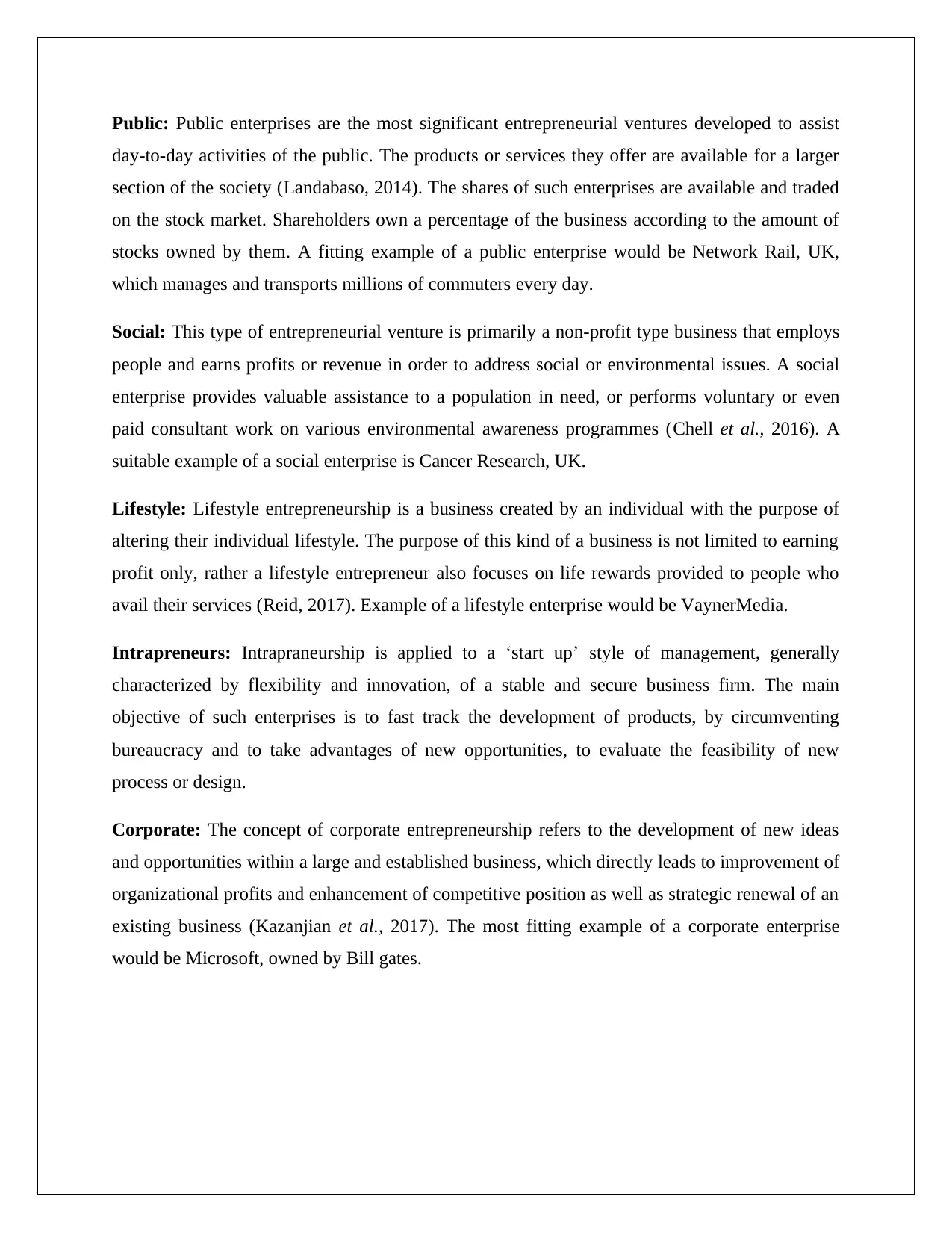
Public: Public enterprises are the most significant entrepreneurial ventures developed to assist
day-to-day activities of the public. The products or services they offer are available for a larger
section of the society (Landabaso, 2014). The shares of such enterprises are available and traded
on the stock market. Shareholders own a percentage of the business according to the amount of
stocks owned by them. A fitting example of a public enterprise would be Network Rail, UK,
which manages and transports millions of commuters every day.
Social: This type of entrepreneurial venture is primarily a non-profit type business that employs
people and earns profits or revenue in order to address social or environmental issues. A social
enterprise provides valuable assistance to a population in need, or performs voluntary or even
paid consultant work on various environmental awareness programmes (Chell et al., 2016). A
suitable example of a social enterprise is Cancer Research, UK.
Lifestyle: Lifestyle entrepreneurship is a business created by an individual with the purpose of
altering their individual lifestyle. The purpose of this kind of a business is not limited to earning
profit only, rather a lifestyle entrepreneur also focuses on life rewards provided to people who
avail their services (Reid, 2017). Example of a lifestyle enterprise would be VaynerMedia.
Intrapreneurs: Intrapraneurship is applied to a ‘start up’ style of management, generally
characterized by flexibility and innovation, of a stable and secure business firm. The main
objective of such enterprises is to fast track the development of products, by circumventing
bureaucracy and to take advantages of new opportunities, to evaluate the feasibility of new
process or design.
Corporate: The concept of corporate entrepreneurship refers to the development of new ideas
and opportunities within a large and established business, which directly leads to improvement of
organizational profits and enhancement of competitive position as well as strategic renewal of an
existing business (Kazanjian et al., 2017). The most fitting example of a corporate enterprise
would be Microsoft, owned by Bill gates.
day-to-day activities of the public. The products or services they offer are available for a larger
section of the society (Landabaso, 2014). The shares of such enterprises are available and traded
on the stock market. Shareholders own a percentage of the business according to the amount of
stocks owned by them. A fitting example of a public enterprise would be Network Rail, UK,
which manages and transports millions of commuters every day.
Social: This type of entrepreneurial venture is primarily a non-profit type business that employs
people and earns profits or revenue in order to address social or environmental issues. A social
enterprise provides valuable assistance to a population in need, or performs voluntary or even
paid consultant work on various environmental awareness programmes (Chell et al., 2016). A
suitable example of a social enterprise is Cancer Research, UK.
Lifestyle: Lifestyle entrepreneurship is a business created by an individual with the purpose of
altering their individual lifestyle. The purpose of this kind of a business is not limited to earning
profit only, rather a lifestyle entrepreneur also focuses on life rewards provided to people who
avail their services (Reid, 2017). Example of a lifestyle enterprise would be VaynerMedia.
Intrapreneurs: Intrapraneurship is applied to a ‘start up’ style of management, generally
characterized by flexibility and innovation, of a stable and secure business firm. The main
objective of such enterprises is to fast track the development of products, by circumventing
bureaucracy and to take advantages of new opportunities, to evaluate the feasibility of new
process or design.
Corporate: The concept of corporate entrepreneurship refers to the development of new ideas
and opportunities within a large and established business, which directly leads to improvement of
organizational profits and enhancement of competitive position as well as strategic renewal of an
existing business (Kazanjian et al., 2017). The most fitting example of a corporate enterprise
would be Microsoft, owned by Bill gates.
Paraphrase This Document
Need a fresh take? Get an instant paraphrase of this document with our AI Paraphraser
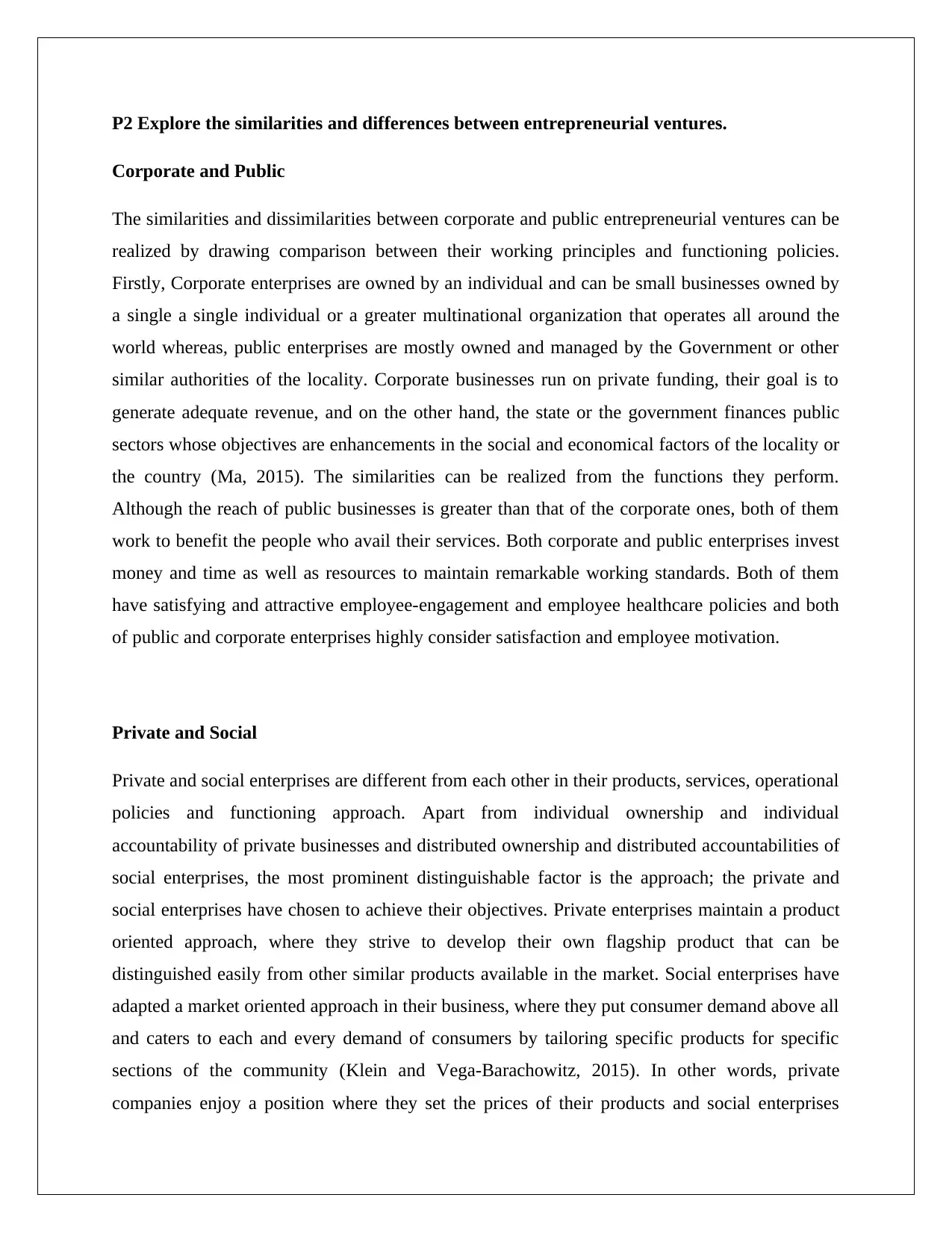
P2 Explore the similarities and differences between entrepreneurial ventures.
Corporate and Public
The similarities and dissimilarities between corporate and public entrepreneurial ventures can be
realized by drawing comparison between their working principles and functioning policies.
Firstly, Corporate enterprises are owned by an individual and can be small businesses owned by
a single a single individual or a greater multinational organization that operates all around the
world whereas, public enterprises are mostly owned and managed by the Government or other
similar authorities of the locality. Corporate businesses run on private funding, their goal is to
generate adequate revenue, and on the other hand, the state or the government finances public
sectors whose objectives are enhancements in the social and economical factors of the locality or
the country (Ma, 2015). The similarities can be realized from the functions they perform.
Although the reach of public businesses is greater than that of the corporate ones, both of them
work to benefit the people who avail their services. Both corporate and public enterprises invest
money and time as well as resources to maintain remarkable working standards. Both of them
have satisfying and attractive employee-engagement and employee healthcare policies and both
of public and corporate enterprises highly consider satisfaction and employee motivation.
Private and Social
Private and social enterprises are different from each other in their products, services, operational
policies and functioning approach. Apart from individual ownership and individual
accountability of private businesses and distributed ownership and distributed accountabilities of
social enterprises, the most prominent distinguishable factor is the approach; the private and
social enterprises have chosen to achieve their objectives. Private enterprises maintain a product
oriented approach, where they strive to develop their own flagship product that can be
distinguished easily from other similar products available in the market. Social enterprises have
adapted a market oriented approach in their business, where they put consumer demand above all
and caters to each and every demand of consumers by tailoring specific products for specific
sections of the community (Klein and Vega-Barachowitz, 2015). In other words, private
companies enjoy a position where they set the prices of their products and social enterprises
Corporate and Public
The similarities and dissimilarities between corporate and public entrepreneurial ventures can be
realized by drawing comparison between their working principles and functioning policies.
Firstly, Corporate enterprises are owned by an individual and can be small businesses owned by
a single a single individual or a greater multinational organization that operates all around the
world whereas, public enterprises are mostly owned and managed by the Government or other
similar authorities of the locality. Corporate businesses run on private funding, their goal is to
generate adequate revenue, and on the other hand, the state or the government finances public
sectors whose objectives are enhancements in the social and economical factors of the locality or
the country (Ma, 2015). The similarities can be realized from the functions they perform.
Although the reach of public businesses is greater than that of the corporate ones, both of them
work to benefit the people who avail their services. Both corporate and public enterprises invest
money and time as well as resources to maintain remarkable working standards. Both of them
have satisfying and attractive employee-engagement and employee healthcare policies and both
of public and corporate enterprises highly consider satisfaction and employee motivation.
Private and Social
Private and social enterprises are different from each other in their products, services, operational
policies and functioning approach. Apart from individual ownership and individual
accountability of private businesses and distributed ownership and distributed accountabilities of
social enterprises, the most prominent distinguishable factor is the approach; the private and
social enterprises have chosen to achieve their objectives. Private enterprises maintain a product
oriented approach, where they strive to develop their own flagship product that can be
distinguished easily from other similar products available in the market. Social enterprises have
adapted a market oriented approach in their business, where they put consumer demand above all
and caters to each and every demand of consumers by tailoring specific products for specific
sections of the community (Klein and Vega-Barachowitz, 2015). In other words, private
companies enjoy a position where they set the prices of their products and social enterprises

provide value for money. Another distinguishable factor between them are that private
enterprises cater to the complaints and provide services to their clients only, the ones who have
availed their services, and on the other hand, social enterprises address a wider range of social
and environmental issues. The most relevant similarity would be saying that both private and
social enterprises play significant roles in the economic development of the region or country in
which they operate.
LO2 Assess the impact of small businesses on the economy
P3 Interpret and assess relevant data and statistics to illustrate how micro and small
businesses impact on the economy.
Impact on the local and regional level
In 2017, the number of businesses per 10000 adult residents was 1069. The London area showed
a remarkable figure of 1519 businesses every 10000 residents, while the North East of UK
showed only 657 businesses per 10000 residents. This shows a greater concentration of business
in the more advanced and developed areas of the UK.
Figure 1: Business Statistics of UK
(Source: boostcapital.co.uk )
enterprises cater to the complaints and provide services to their clients only, the ones who have
availed their services, and on the other hand, social enterprises address a wider range of social
and environmental issues. The most relevant similarity would be saying that both private and
social enterprises play significant roles in the economic development of the region or country in
which they operate.
LO2 Assess the impact of small businesses on the economy
P3 Interpret and assess relevant data and statistics to illustrate how micro and small
businesses impact on the economy.
Impact on the local and regional level
In 2017, the number of businesses per 10000 adult residents was 1069. The London area showed
a remarkable figure of 1519 businesses every 10000 residents, while the North East of UK
showed only 657 businesses per 10000 residents. This shows a greater concentration of business
in the more advanced and developed areas of the UK.
Figure 1: Business Statistics of UK
(Source: boostcapital.co.uk )
⊘ This is a preview!⊘
Do you want full access?
Subscribe today to unlock all pages.

Trusted by 1+ million students worldwide

The table above gives the detailed spread of business by regions. Out of the total, one third of the
businesses are in London or the south-eastern region of the UK. The figure stands at 1.1 million
in London and 929000 in the South East. However, as against such strong figures there are only
132000 businesses in Northern Ireland and 142000 in the North East. There was a 6% reduction
in the number of industries in Wales, but there was an aggregate rise of 4% in the entire UK. The
North East of England also suffered a shrinking of businesses.
Figure 2: Private Sector Businesses in UK
(Source: boostcapital.co.uk)
Impact on the national level
Data suggests that in the year 2017, UK had over 5.7 million businesses, out of which 5.5 million
were micro businesses. The figure has gone up by 64% since 2000.the number of businesses has
risen up on a yearly average of The SMEs have played a crucial role in shaping the growth of the
businesses are in London or the south-eastern region of the UK. The figure stands at 1.1 million
in London and 929000 in the South East. However, as against such strong figures there are only
132000 businesses in Northern Ireland and 142000 in the North East. There was a 6% reduction
in the number of industries in Wales, but there was an aggregate rise of 4% in the entire UK. The
North East of England also suffered a shrinking of businesses.
Figure 2: Private Sector Businesses in UK
(Source: boostcapital.co.uk)
Impact on the national level
Data suggests that in the year 2017, UK had over 5.7 million businesses, out of which 5.5 million
were micro businesses. The figure has gone up by 64% since 2000.the number of businesses has
risen up on a yearly average of The SMEs have played a crucial role in shaping the growth of the
Paraphrase This Document
Need a fresh take? Get an instant paraphrase of this document with our AI Paraphraser
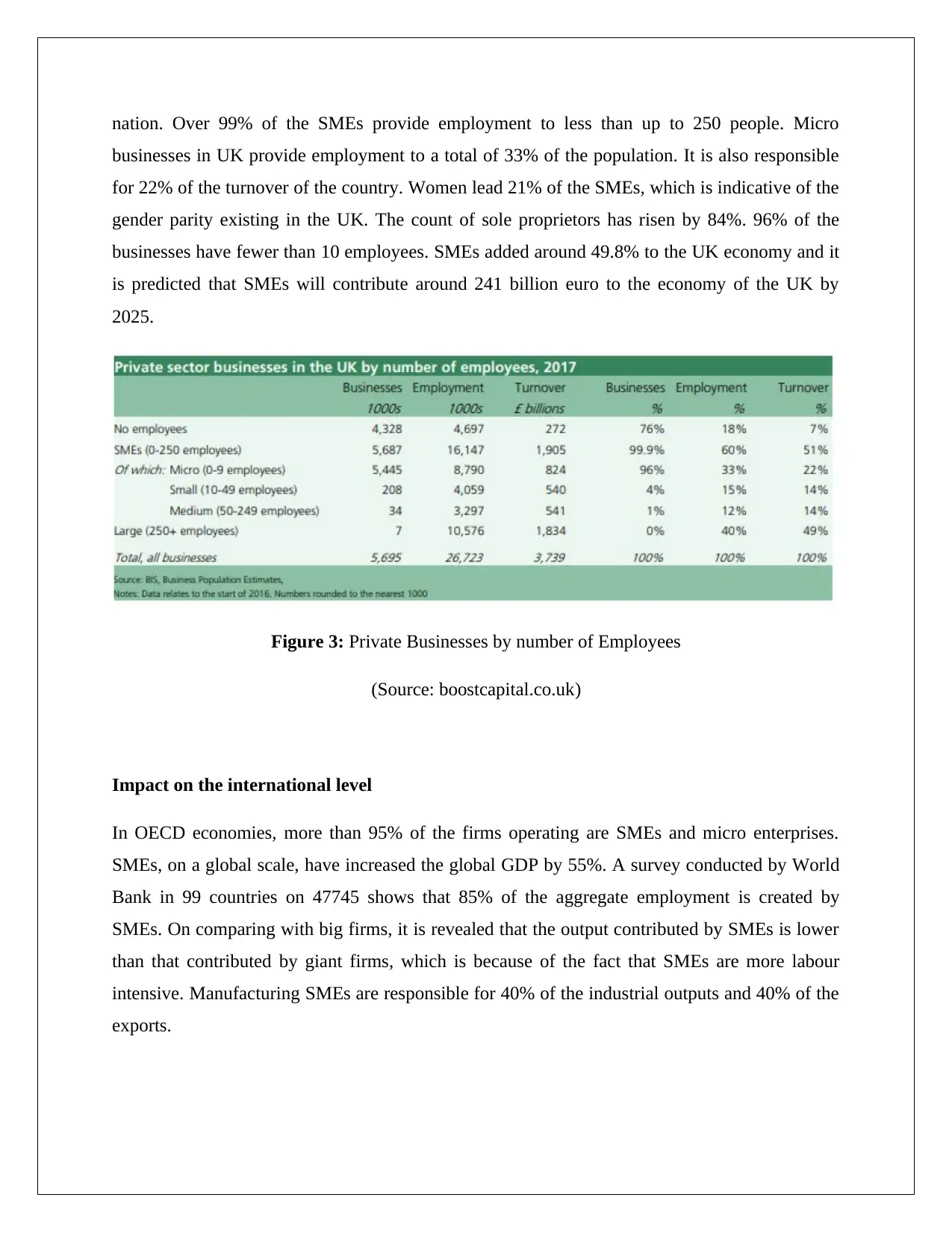
nation. Over 99% of the SMEs provide employment to less than up to 250 people. Micro
businesses in UK provide employment to a total of 33% of the population. It is also responsible
for 22% of the turnover of the country. Women lead 21% of the SMEs, which is indicative of the
gender parity existing in the UK. The count of sole proprietors has risen by 84%. 96% of the
businesses have fewer than 10 employees. SMEs added around 49.8% to the UK economy and it
is predicted that SMEs will contribute around 241 billion euro to the economy of the UK by
2025.
Figure 3: Private Businesses by number of Employees
(Source: boostcapital.co.uk)
Impact on the international level
In OECD economies, more than 95% of the firms operating are SMEs and micro enterprises.
SMEs, on a global scale, have increased the global GDP by 55%. A survey conducted by World
Bank in 99 countries on 47745 shows that 85% of the aggregate employment is created by
SMEs. On comparing with big firms, it is revealed that the output contributed by SMEs is lower
than that contributed by giant firms, which is because of the fact that SMEs are more labour
intensive. Manufacturing SMEs are responsible for 40% of the industrial outputs and 40% of the
exports.
businesses in UK provide employment to a total of 33% of the population. It is also responsible
for 22% of the turnover of the country. Women lead 21% of the SMEs, which is indicative of the
gender parity existing in the UK. The count of sole proprietors has risen by 84%. 96% of the
businesses have fewer than 10 employees. SMEs added around 49.8% to the UK economy and it
is predicted that SMEs will contribute around 241 billion euro to the economy of the UK by
2025.
Figure 3: Private Businesses by number of Employees
(Source: boostcapital.co.uk)
Impact on the international level
In OECD economies, more than 95% of the firms operating are SMEs and micro enterprises.
SMEs, on a global scale, have increased the global GDP by 55%. A survey conducted by World
Bank in 99 countries on 47745 shows that 85% of the aggregate employment is created by
SMEs. On comparing with big firms, it is revealed that the output contributed by SMEs is lower
than that contributed by giant firms, which is because of the fact that SMEs are more labour
intensive. Manufacturing SMEs are responsible for 40% of the industrial outputs and 40% of the
exports.
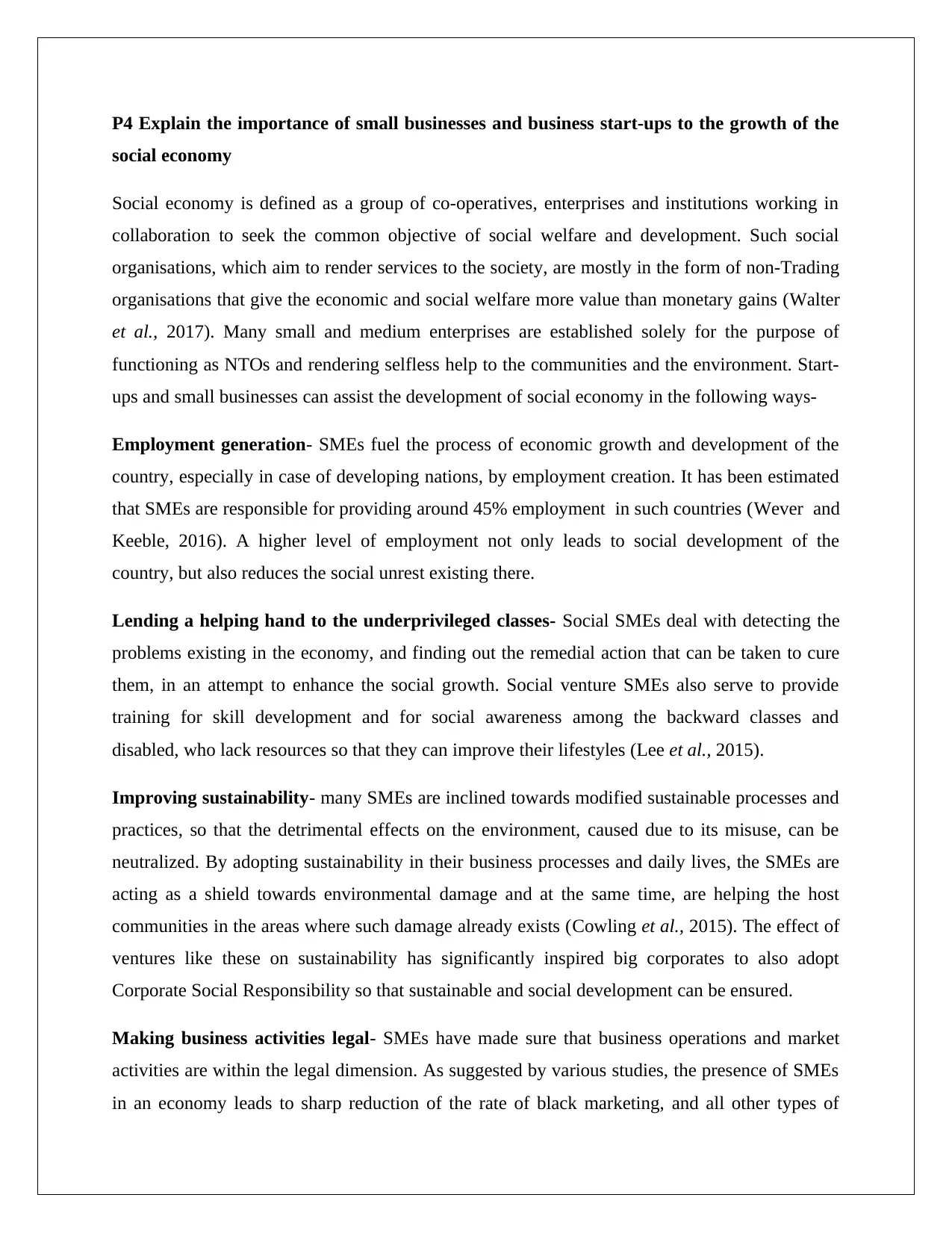
P4 Explain the importance of small businesses and business start-ups to the growth of the
social economy
Social economy is defined as a group of co-operatives, enterprises and institutions working in
collaboration to seek the common objective of social welfare and development. Such social
organisations, which aim to render services to the society, are mostly in the form of non-Trading
organisations that give the economic and social welfare more value than monetary gains (Walter
et al., 2017). Many small and medium enterprises are established solely for the purpose of
functioning as NTOs and rendering selfless help to the communities and the environment. Start-
ups and small businesses can assist the development of social economy in the following ways-
Employment generation- SMEs fuel the process of economic growth and development of the
country, especially in case of developing nations, by employment creation. It has been estimated
that SMEs are responsible for providing around 45% employment in such countries (Wever and
Keeble, 2016). A higher level of employment not only leads to social development of the
country, but also reduces the social unrest existing there.
Lending a helping hand to the underprivileged classes- Social SMEs deal with detecting the
problems existing in the economy, and finding out the remedial action that can be taken to cure
them, in an attempt to enhance the social growth. Social venture SMEs also serve to provide
training for skill development and for social awareness among the backward classes and
disabled, who lack resources so that they can improve their lifestyles (Lee et al., 2015).
Improving sustainability- many SMEs are inclined towards modified sustainable processes and
practices, so that the detrimental effects on the environment, caused due to its misuse, can be
neutralized. By adopting sustainability in their business processes and daily lives, the SMEs are
acting as a shield towards environmental damage and at the same time, are helping the host
communities in the areas where such damage already exists (Cowling et al., 2015). The effect of
ventures like these on sustainability has significantly inspired big corporates to also adopt
Corporate Social Responsibility so that sustainable and social development can be ensured.
Making business activities legal- SMEs have made sure that business operations and market
activities are within the legal dimension. As suggested by various studies, the presence of SMEs
in an economy leads to sharp reduction of the rate of black marketing, and all other types of
social economy
Social economy is defined as a group of co-operatives, enterprises and institutions working in
collaboration to seek the common objective of social welfare and development. Such social
organisations, which aim to render services to the society, are mostly in the form of non-Trading
organisations that give the economic and social welfare more value than monetary gains (Walter
et al., 2017). Many small and medium enterprises are established solely for the purpose of
functioning as NTOs and rendering selfless help to the communities and the environment. Start-
ups and small businesses can assist the development of social economy in the following ways-
Employment generation- SMEs fuel the process of economic growth and development of the
country, especially in case of developing nations, by employment creation. It has been estimated
that SMEs are responsible for providing around 45% employment in such countries (Wever and
Keeble, 2016). A higher level of employment not only leads to social development of the
country, but also reduces the social unrest existing there.
Lending a helping hand to the underprivileged classes- Social SMEs deal with detecting the
problems existing in the economy, and finding out the remedial action that can be taken to cure
them, in an attempt to enhance the social growth. Social venture SMEs also serve to provide
training for skill development and for social awareness among the backward classes and
disabled, who lack resources so that they can improve their lifestyles (Lee et al., 2015).
Improving sustainability- many SMEs are inclined towards modified sustainable processes and
practices, so that the detrimental effects on the environment, caused due to its misuse, can be
neutralized. By adopting sustainability in their business processes and daily lives, the SMEs are
acting as a shield towards environmental damage and at the same time, are helping the host
communities in the areas where such damage already exists (Cowling et al., 2015). The effect of
ventures like these on sustainability has significantly inspired big corporates to also adopt
Corporate Social Responsibility so that sustainable and social development can be ensured.
Making business activities legal- SMEs have made sure that business operations and market
activities are within the legal dimension. As suggested by various studies, the presence of SMEs
in an economy leads to sharp reduction of the rate of black marketing, and all other types of
⊘ This is a preview!⊘
Do you want full access?
Subscribe today to unlock all pages.

Trusted by 1+ million students worldwide

unlawful activities. Transparency in business activities helps to bring down the chances of
business failure, which is a major concern mostly in the developing nations.
Conclusion
The impact of small and medium sized businesses on the local and national economy is
undeniable. In this study, different entrepreneurial ventures were discussed in detail and their
similarities and dissimilarities were evaluated. The impact, small and medium sized businesses
have on the economy on a regional , national and international level were discussed and the role
of such businesses and start-up enterprises were evaluated and their impact on the social
economy were evident from the evaluation. Therefore, it can be concluded that small and
medium sized businesses play an important role for the betterment of the society and economy.
business failure, which is a major concern mostly in the developing nations.
Conclusion
The impact of small and medium sized businesses on the local and national economy is
undeniable. In this study, different entrepreneurial ventures were discussed in detail and their
similarities and dissimilarities were evaluated. The impact, small and medium sized businesses
have on the economy on a regional , national and international level were discussed and the role
of such businesses and start-up enterprises were evaluated and their impact on the social
economy were evident from the evaluation. Therefore, it can be concluded that small and
medium sized businesses play an important role for the betterment of the society and economy.
Paraphrase This Document
Need a fresh take? Get an instant paraphrase of this document with our AI Paraphraser
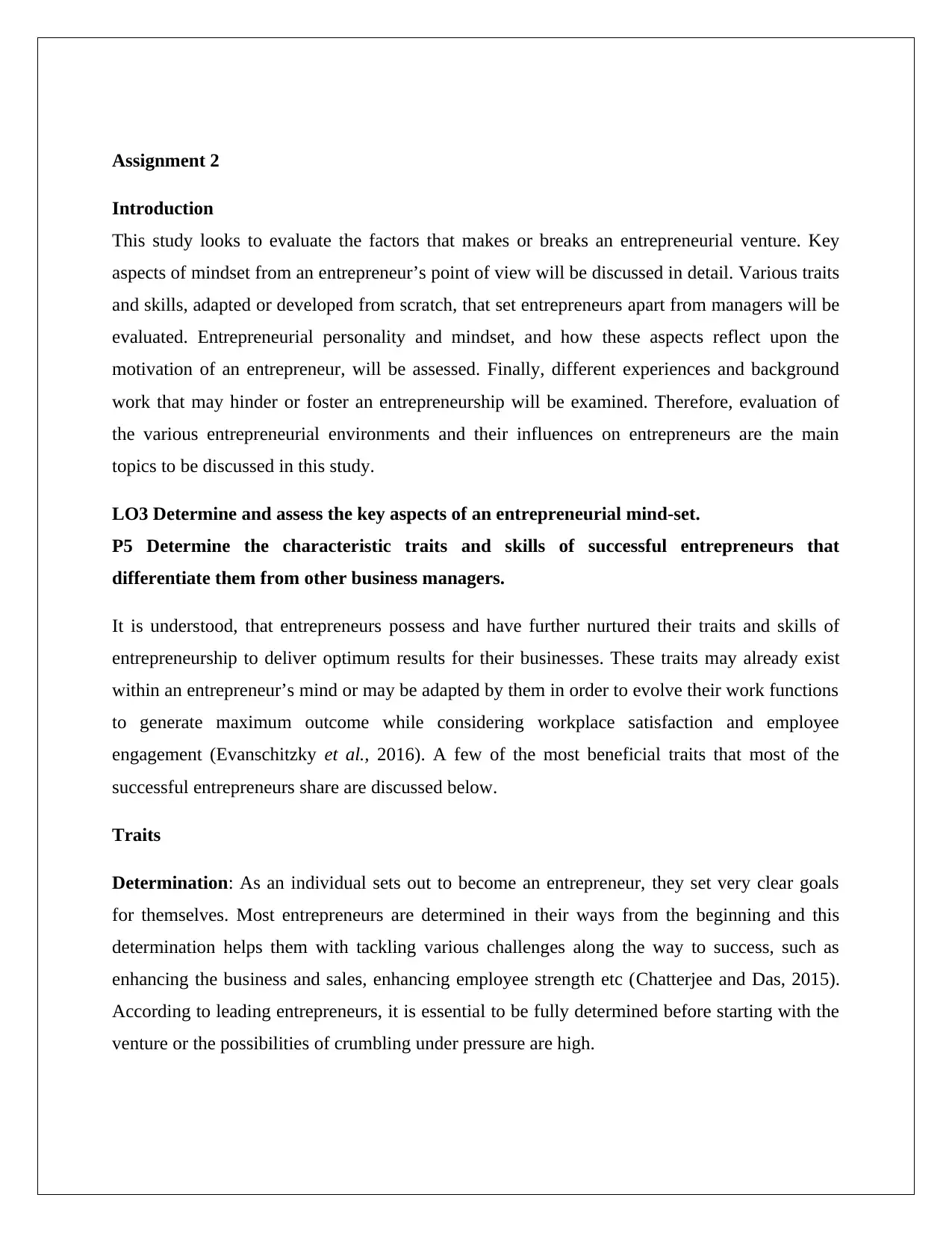
Assignment 2
Introduction
This study looks to evaluate the factors that makes or breaks an entrepreneurial venture. Key
aspects of mindset from an entrepreneur’s point of view will be discussed in detail. Various traits
and skills, adapted or developed from scratch, that set entrepreneurs apart from managers will be
evaluated. Entrepreneurial personality and mindset, and how these aspects reflect upon the
motivation of an entrepreneur, will be assessed. Finally, different experiences and background
work that may hinder or foster an entrepreneurship will be examined. Therefore, evaluation of
the various entrepreneurial environments and their influences on entrepreneurs are the main
topics to be discussed in this study.
LO3 Determine and assess the key aspects of an entrepreneurial mind-set.
P5 Determine the characteristic traits and skills of successful entrepreneurs that
differentiate them from other business managers.
It is understood, that entrepreneurs possess and have further nurtured their traits and skills of
entrepreneurship to deliver optimum results for their businesses. These traits may already exist
within an entrepreneur’s mind or may be adapted by them in order to evolve their work functions
to generate maximum outcome while considering workplace satisfaction and employee
engagement (Evanschitzky et al., 2016). A few of the most beneficial traits that most of the
successful entrepreneurs share are discussed below.
Traits
Determination: As an individual sets out to become an entrepreneur, they set very clear goals
for themselves. Most entrepreneurs are determined in their ways from the beginning and this
determination helps them with tackling various challenges along the way to success, such as
enhancing the business and sales, enhancing employee strength etc (Chatterjee and Das, 2015).
According to leading entrepreneurs, it is essential to be fully determined before starting with the
venture or the possibilities of crumbling under pressure are high.
Introduction
This study looks to evaluate the factors that makes or breaks an entrepreneurial venture. Key
aspects of mindset from an entrepreneur’s point of view will be discussed in detail. Various traits
and skills, adapted or developed from scratch, that set entrepreneurs apart from managers will be
evaluated. Entrepreneurial personality and mindset, and how these aspects reflect upon the
motivation of an entrepreneur, will be assessed. Finally, different experiences and background
work that may hinder or foster an entrepreneurship will be examined. Therefore, evaluation of
the various entrepreneurial environments and their influences on entrepreneurs are the main
topics to be discussed in this study.
LO3 Determine and assess the key aspects of an entrepreneurial mind-set.
P5 Determine the characteristic traits and skills of successful entrepreneurs that
differentiate them from other business managers.
It is understood, that entrepreneurs possess and have further nurtured their traits and skills of
entrepreneurship to deliver optimum results for their businesses. These traits may already exist
within an entrepreneur’s mind or may be adapted by them in order to evolve their work functions
to generate maximum outcome while considering workplace satisfaction and employee
engagement (Evanschitzky et al., 2016). A few of the most beneficial traits that most of the
successful entrepreneurs share are discussed below.
Traits
Determination: As an individual sets out to become an entrepreneur, they set very clear goals
for themselves. Most entrepreneurs are determined in their ways from the beginning and this
determination helps them with tackling various challenges along the way to success, such as
enhancing the business and sales, enhancing employee strength etc (Chatterjee and Das, 2015).
According to leading entrepreneurs, it is essential to be fully determined before starting with the
venture or the possibilities of crumbling under pressure are high.
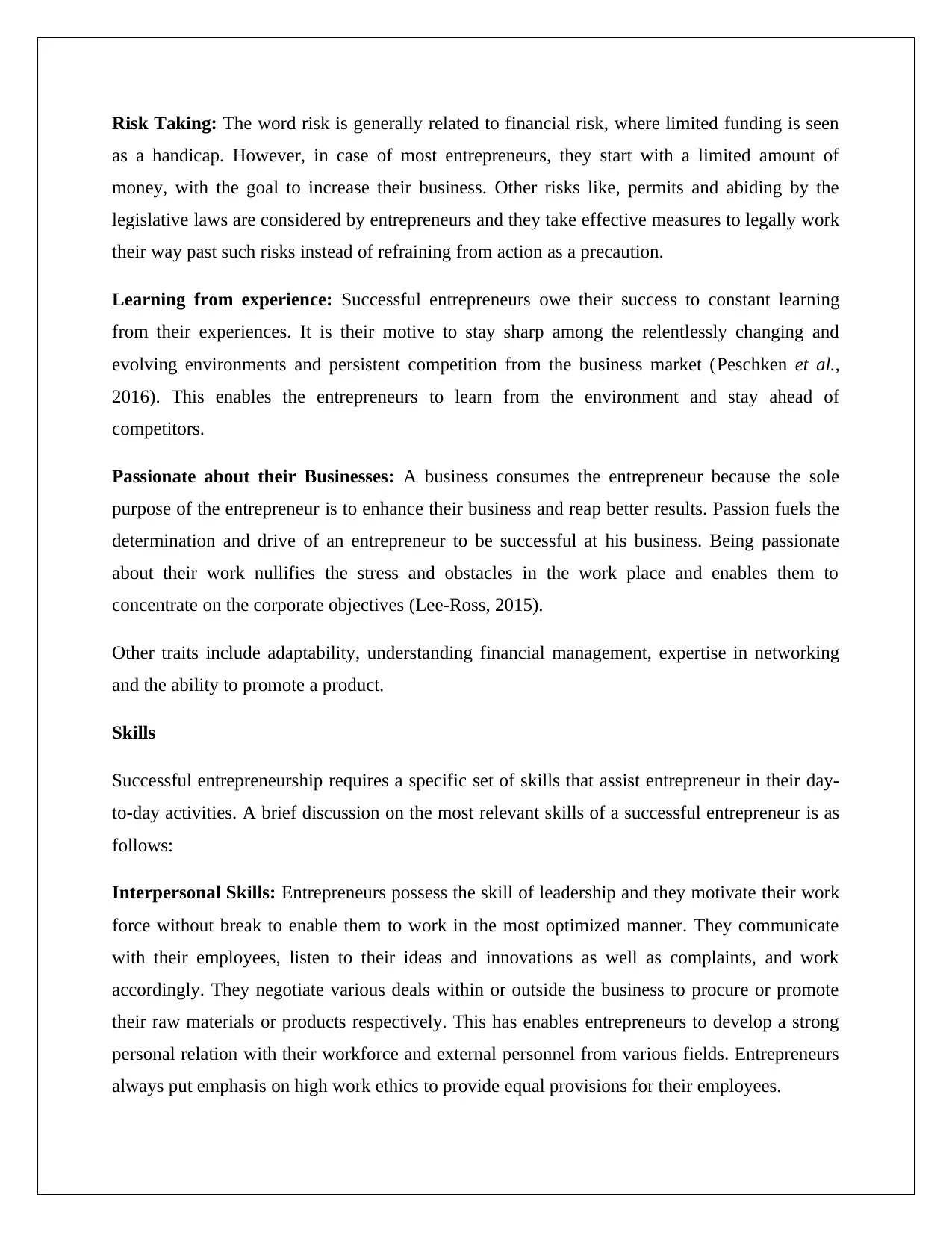
Risk Taking: The word risk is generally related to financial risk, where limited funding is seen
as a handicap. However, in case of most entrepreneurs, they start with a limited amount of
money, with the goal to increase their business. Other risks like, permits and abiding by the
legislative laws are considered by entrepreneurs and they take effective measures to legally work
their way past such risks instead of refraining from action as a precaution.
Learning from experience: Successful entrepreneurs owe their success to constant learning
from their experiences. It is their motive to stay sharp among the relentlessly changing and
evolving environments and persistent competition from the business market (Peschken et al.,
2016). This enables the entrepreneurs to learn from the environment and stay ahead of
competitors.
Passionate about their Businesses: A business consumes the entrepreneur because the sole
purpose of the entrepreneur is to enhance their business and reap better results. Passion fuels the
determination and drive of an entrepreneur to be successful at his business. Being passionate
about their work nullifies the stress and obstacles in the work place and enables them to
concentrate on the corporate objectives (Lee-Ross, 2015).
Other traits include adaptability, understanding financial management, expertise in networking
and the ability to promote a product.
Skills
Successful entrepreneurship requires a specific set of skills that assist entrepreneur in their day-
to-day activities. A brief discussion on the most relevant skills of a successful entrepreneur is as
follows:
Interpersonal Skills: Entrepreneurs possess the skill of leadership and they motivate their work
force without break to enable them to work in the most optimized manner. They communicate
with their employees, listen to their ideas and innovations as well as complaints, and work
accordingly. They negotiate various deals within or outside the business to procure or promote
their raw materials or products respectively. This has enables entrepreneurs to develop a strong
personal relation with their workforce and external personnel from various fields. Entrepreneurs
always put emphasis on high work ethics to provide equal provisions for their employees.
as a handicap. However, in case of most entrepreneurs, they start with a limited amount of
money, with the goal to increase their business. Other risks like, permits and abiding by the
legislative laws are considered by entrepreneurs and they take effective measures to legally work
their way past such risks instead of refraining from action as a precaution.
Learning from experience: Successful entrepreneurs owe their success to constant learning
from their experiences. It is their motive to stay sharp among the relentlessly changing and
evolving environments and persistent competition from the business market (Peschken et al.,
2016). This enables the entrepreneurs to learn from the environment and stay ahead of
competitors.
Passionate about their Businesses: A business consumes the entrepreneur because the sole
purpose of the entrepreneur is to enhance their business and reap better results. Passion fuels the
determination and drive of an entrepreneur to be successful at his business. Being passionate
about their work nullifies the stress and obstacles in the work place and enables them to
concentrate on the corporate objectives (Lee-Ross, 2015).
Other traits include adaptability, understanding financial management, expertise in networking
and the ability to promote a product.
Skills
Successful entrepreneurship requires a specific set of skills that assist entrepreneur in their day-
to-day activities. A brief discussion on the most relevant skills of a successful entrepreneur is as
follows:
Interpersonal Skills: Entrepreneurs possess the skill of leadership and they motivate their work
force without break to enable them to work in the most optimized manner. They communicate
with their employees, listen to their ideas and innovations as well as complaints, and work
accordingly. They negotiate various deals within or outside the business to procure or promote
their raw materials or products respectively. This has enables entrepreneurs to develop a strong
personal relation with their workforce and external personnel from various fields. Entrepreneurs
always put emphasis on high work ethics to provide equal provisions for their employees.
⊘ This is a preview!⊘
Do you want full access?
Subscribe today to unlock all pages.

Trusted by 1+ million students worldwide
1 out of 19
Related Documents
Your All-in-One AI-Powered Toolkit for Academic Success.
+13062052269
info@desklib.com
Available 24*7 on WhatsApp / Email
![[object Object]](/_next/static/media/star-bottom.7253800d.svg)
Unlock your academic potential
Copyright © 2020–2025 A2Z Services. All Rights Reserved. Developed and managed by ZUCOL.



